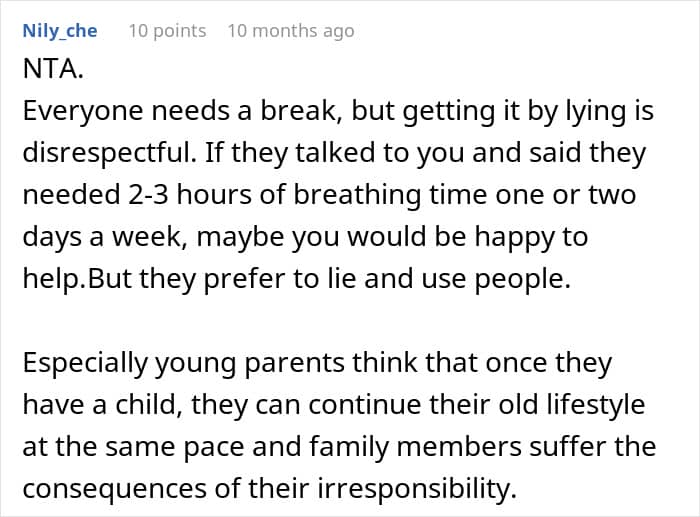Many people would agree that a child’s infancy is one of the most (if not the most) challenging periods of parenthood. It is when they need to be most hands-on and will need to devote most of their time and energy to caring for the baby.
However, it does not allow anyone to pass these obligations onto another person whenever they want to. This idea seemed amiss to a woman who thought she could ask her sister-in-law to babysit her two-month-old son on a whim.
She soon realized her mistake when she suddenly faced the threat of being reported for child abandonment. However, she didn’t let things slide and tried to get the entire family to side with her.
RELATED:A woman agreed to occasionally babysit her sister-in-law’s son

SIL’s babysitting requests became more frequent, until it all came to a head one day










The author clarified some parts of her story






Image source: Ok-Lemon4182
Women tend to be more selfless when it comes to family, and it can backfire, sometimes

SIL broke their agreement on and off for four months, which the author tolerated. This could be a reason why her in-laws saw nothing wrong with what they were doing and even tried to silently gaslight her.
According to NYC-based psychotherapist Vikki Stark, M.S.W., women feel obligated to be selfless, especially when it comes to family.
“Putting everyone else’s needs before our own and feeling good about that — like it’s what a woman should be doing,” she wrote, adding that to be called selfish is the “meanest curse.”
Stark added that many women tend to allow their families to take advantage of them to “steer clear of guilt” because they are “phobic” about being perceived to have wronged.
However, boundaries are necessary, even with family. These are limits we set with others to determine what is acceptable and what is not. As psychotherapist Dr. Ilene Strauss Cohen notes, they aren’t walls. They are guidelines.
Consistency and assertiveness are key to enforcing boundaries. In her article, Cohen reminds readers about the importance of saying no. It is, after all, a complete sentence.
And if necessary, reinforce with actions, especially when boundaries are violated. The author did what she had to do: set her limits, which her SIL finally conceded to when she threatened a merited sanction. Her mother’s complaints aside, she was able to get her message across.
Most readers sided with her, with some sharing their suggestions



























